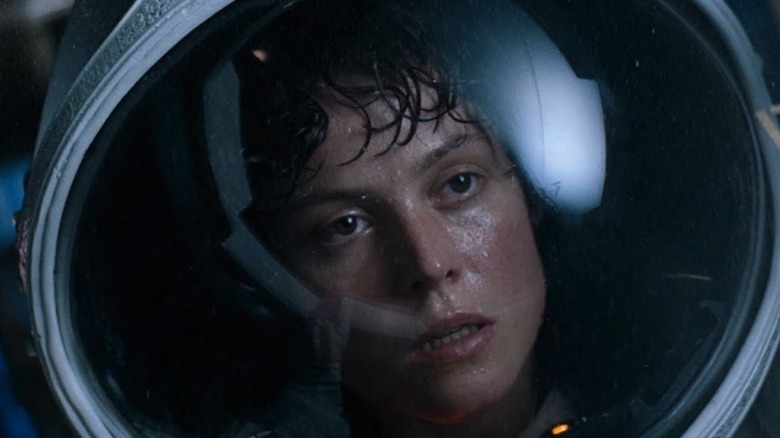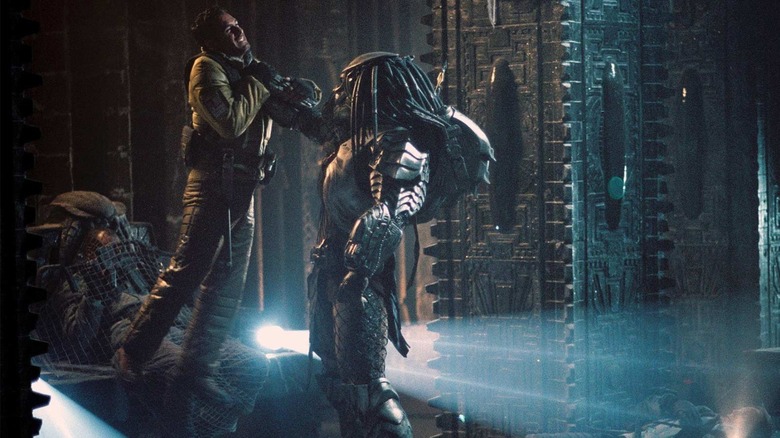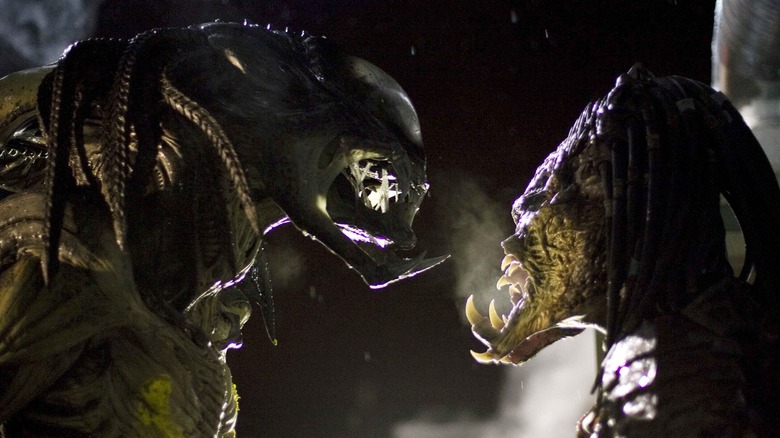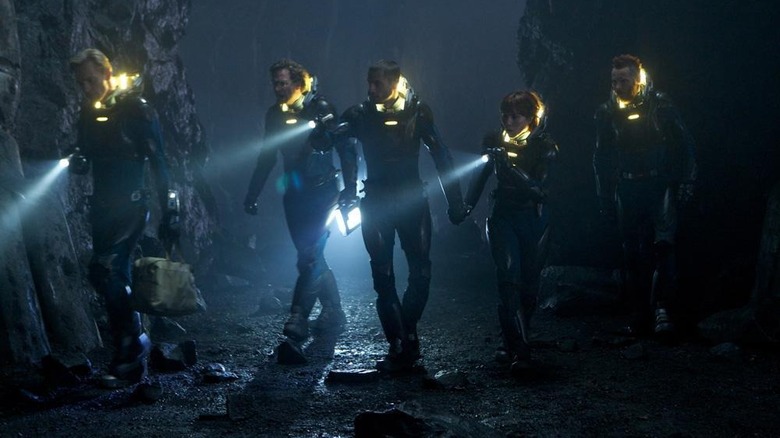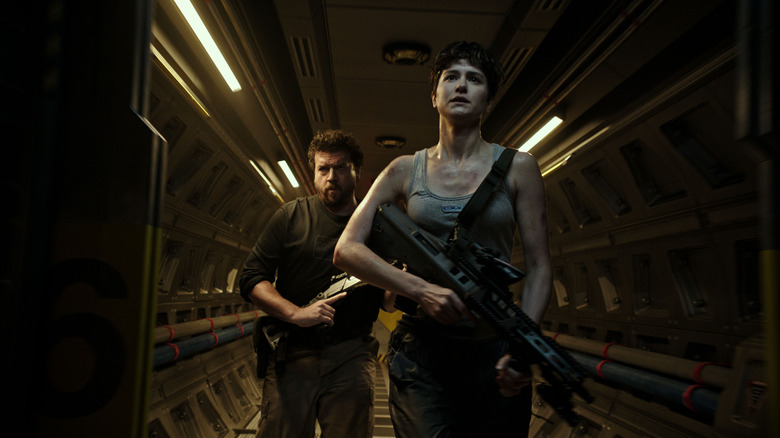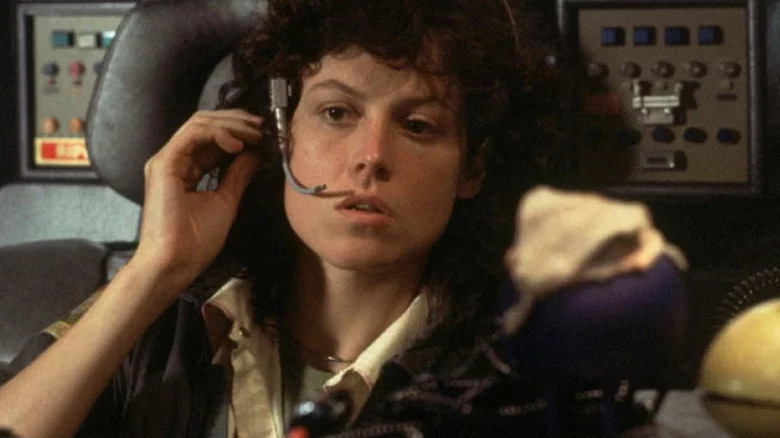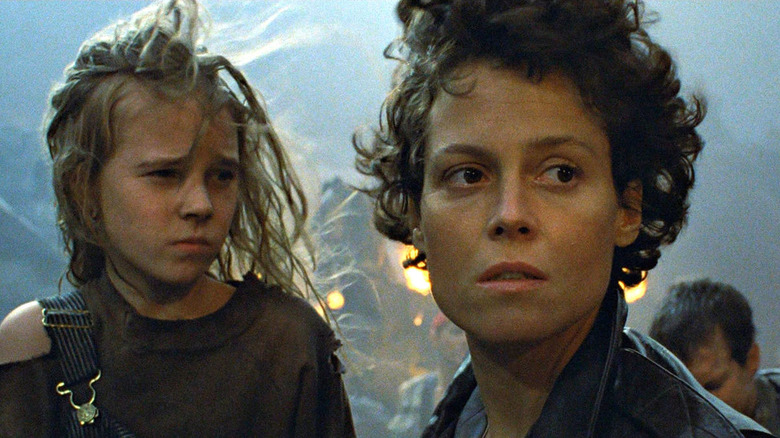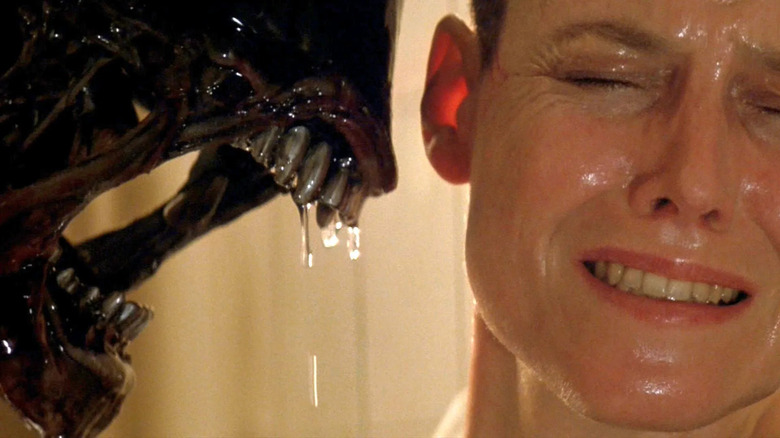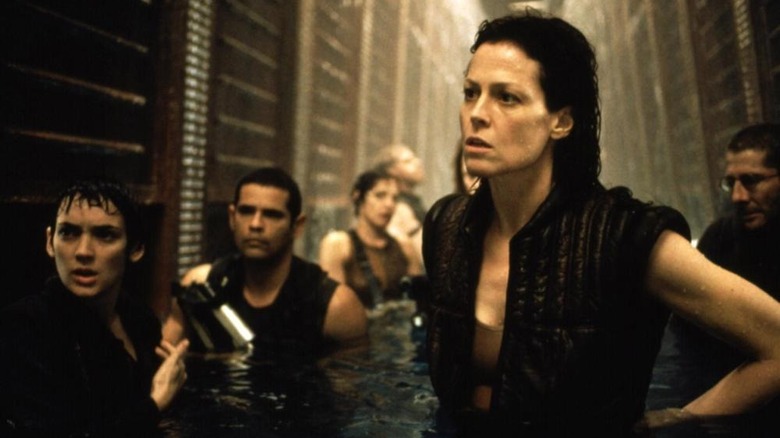This Is The Correct Order In Which To Watch The Alien Franchise
Much like the terrifying creatures depicted in the 1979 franchise-kickstarting film, Ridley Scott's epic sci-fi horror classic "Alien" has spawned many offspring.
James Cameron's equally-beloved 1986 sequel was the first to follow in Scott's footsteps, while the 1990s saw two bold, if less-than-well-received, additions to the franchise. The 2000s leaned into a spinoff series conceived to combine the mythology of the "Alien" and "Predator" franchises. Ridley Scott then returned to the realm of "Alien" in 2012 with "Prometheus" (a very loose prequel to "Alien") and its quasi-sequel, 2017's "Alien: Covenant" in 2017.
If you're a little confused, you're not alone. Mapping out the mythology and timeline of the "Alien" franchise can be difficult, especially since there are huge gaps (some over a hundred years) between certain films. While some prefer to watch the "Alien" films in order of release (after all, that's how most viewers watched them before streaming became a thing), if you're invested in following the timeline of the franchise as it exists (or, perhaps, looking to experience them in an entirely new way), keep reading to find out the correct order in which to watch the "Alien" films — chronologically speaking.
Alien vs Predator (2004)
At first blush, it might seem strange to start an "Alien" journey with an "Alien" spin-off, but if accuracy is your aim, it's the place to begin.
Fortunately, "Alien vs. Predator" is a fun film, even if it's far from the best of the franchise. Set in 2004 (the same year it came out), the flick follows a loaded industrialist named Charles Weyland (Lance Henriksen) who finances an expedition to Antarctica in order to discover the source of an unexplained heat bloom. Led by no-nonsense guide Alexa Woods (Sanaa Lathan), the expedition discovers a pyramid filled with parasitic aliens. The situation is all the more perilous as they encounter another alien species, known as Predators, there to hunt the aliens (known as xenomorphs).
The "AVP" films get complicated, because technically they're not a canonical part of the "Alien" franchise and exist in a distinct universe with its own rules. For that reason, it's not strictly necessary to watch the "AVP" films if you want to understand the full canon of the "Alien" series. There are certainly loads of contradictory elements when you compare the "Alien" films with the "AVP" films, particularly considering the latter franchise essentially posits that the xenomorphs only exist on Earth in order to teach the Predators how to hunt.
But ignoring all of that for a moment, "Alien vs Predator" is an entertaining, if silly, film worth tracking down. Sanaa Lathan has some unexpectedly weird and moving moments with a Predator (a la Ripley and the newborn alien in "Alien: Resurrection") that are, if nothing else, a fun throwback.
Alien vs Predator – Requiem (2007)
Honestly, "Alien vs Predator — Requiem" is not a good film, and you probably shouldn't watch it. But, if you're intent on working through each film in true chronological order, it should technically be the next one you watch. "Alien vs Predator — Requiem," which came out in 2007, takes place directly after the events of "Alien vs Predator."
While the events of "Alien vs Predator" take place in an uninhabited region of Antarctica, in the film's sequel, the drama occurs much closer to humankind. When a Predator spaceship carrying a bunch of facehuggers crash lands in Colorado, the residents of a small town are caught in the middle of an extra-terrestrial battle. The remaining Predator is on a mission to destroy the remaining xenomorphs, no matter the cost.
The only intriguing part of the film is the cross-species mashup the audience is treated to when a chestburster explodes out of a Predator. It's an interesting idea, but one that sadly won't be explored further in future "Alien" projects. Otherwise, the film has virtually no redeeming qualities. It's poorly edited, so badly lit it's hard to see the action, and it doesn't bring anything new to the table for either franchise.
Prometheus (2012)
Scott's return to the "Alien" franchise is set some 90 years after the events of the "AVP" films, from 2091 to 2094. Though Sir Ridley has maintained that "Prometheus" is not a direct sequel to "Alien" but rather contains strands of the same "DNA," it does add to the mythology of the franchise in some fascinating ways.
The mission of the "Prometheus" team is both existential and theological in nature, as they travel to a moon known as LV-223. The mission is funded by a very elderly Peter Wayland (Guy Pierce), the same wealthy industrialist who funded the mission in "Alien vs. Predator." Fans are also introduced to David (Michael Fassbender), an early android with hidden intentions. The crew aboard the ship learn that humankind was created by an advanced group of aliens known as Engineers, who have all but gone extinct. While on LV-223, they encounter a colony of parasitic aliens who hold not the key to life's creation, but rather a portal to its horrific destruction.
Within the "Alien" franchise, the most important discovery in "Prometheus" is the arrival of the proto-xenomorph creatures the crew encounters. Technically, these creatures—– such as the worm-like hammerpede that attacks Millburn — are not the xenomorphs fans know and love, but they give viewers insights into how the more familiar-looking aliens may have evolved.
Alien: Covenant (2017)
A sequel to "Prometheus" (and technically another quasi-prequel to the first "Alien" film), "Covenant" takes place in 2104, about 11 years after the events of "Prometheus." The flick follows a colonization mission sent to begin a settlement on a far away planet. When the ship diverts from its course, they arrive on a lush, Earth-like planet, which they imagine might be the perfect place to start a colony; they couldn't be more wrong.
The crew — including their David-like android Walter (also played by (Michael Fassbender), Oram (Billy Crudup), Tennessee (Danny McBride) and Ricks (Jussie Smollett) — explore the new planet, only to encounter xenomorphs even more terrifying than those seen in "Prometheus."
The most important unearthed piece of information in "Alien: Covenant" is the origin of the xenomorphs; viewers saw a group of proto-xenomorphs in "Prometheus," but here David— who has been living on his own this whole time — is revealed to have been tinkering with the aliens in order to create a bigger, badder, scarier species.
The most perplexing part of the film is David's motivations for literally anything he does, making the events of the film sometimes hard to follow. But, on the plus side, there are two Michael Fassbenders, and the actor does a great job differentiating between the harmless Walter and the devious, terrifying David. The film doesn't quite explain how the xenomorphs David has engineered become the xenomorphs in the first "Alien" film, which might upset some lore experts, but it's a pretty wild ride if you're willing to make the leap.
Alien (1979)
When Ridley Scott's legendary film first hit the scene, it was hailed as a transgressive, groundbreaking sci-fi horror masterpiece. Decades later, it remains an incredibly rich text, filled with fascinating analogies about bodily autonomy, rape, childbirth, masculinity, and Freudian sexual impulses. But, all these ideological undertones aside, it's also a really great horror film awash with terrifying creatures and spellbinding practical effects.
"Alien" takes place in the year 2122, eighteen years after the events of "Alien: Covenant." Ripley (Sigourney Weaver) and her team are working aboard a corporate-owned merchant ship called Nostromo when they hear a distress call. What they find when they answer the call, is — you guessed it — the xenomorphs (or at least a version of them) encountered in "Prometheus" and "Alien: Covenant."
It's hard to argue that "Alien" is anything but the best of the franchise (though "Aliens" certainly gives it a run for its money), and it's incredible how well the film holds up more than forty years later. The xenomorphs in the film are still the most effective in the whole series, and the initial chestburster sequence remains one of the most impressive horror moments in any horror film, ever. The film also succinctly, powerfully introduces themes that will undergird the entire franchise — corporate exploitation of the working class, the brutality of capitalism, the abject horror of losing one's bodily autonomy — while simultaneously cementing Weaver's Ripley as one of the great horror heroes of all time.
Aliens (1986)
A brilliant sequel to Scott's masterpiece, Cameron's "Aliens" works in part because it plays to his strengths as a director. Whereas "Alien" falls clearly into the sci-fi/horror genre, Cameron's film is structured much more like an action film, albeit with gnarly extra-terrestrial elements thrown in.
The film takes place in 2179, more than 50 years after the events of "Alien." Ripley has been floating around in her space pod for decades and is woken up from cryo-sleep when Weyland-Yutani Corp decide her services are needed. They've lost contact with a colony on LV-426 (the same planet where Ripley and the crew first encountered the xenomorphs in the first film), so Ripley and a group of Marines are sent to investigate, and what they find is nothing short of a total horror show.
While "Aliens" might initially come off as a middle-of-the-road action flick, it contains much hidden depth. Putting aside the brilliance of turning a military movie into an alien extravaganza, the film works as a metaphor for the Vietnam war, as well as an admonishment of war in general. Even more incisively, Cameron's film takes aim at the evils of capitalism and its tendency to send men and women to die in the name of increasing profits. Though "Aliens" is very much a Cameron film, the film's genius is that it takes themes Scott introduced and places them in a new context, with thrilling results.
Alien 3 (1992)
David Fincher's first feature film is considered by some to be his worst — although it's probably not Fincher's fault — and it might also be the worst in the franchise as a whole. Luckily, Weaver is still here doing her thing.
"Alien 3" is set in 2179, just after the events of "Aliens." Ripley only had a moment of rest in her cryostasis pod, crash-landing on a prison planet called Fiora 161. Ripley is immediately concerned that she didn't make the journey alone, and she's right to be. As it turns out, a nasty xenomorph has stowed away on the ship with her, and it makes its presence known via a poor, unassuming dog (which represents one of the better inventions in the film).
Despite its many pitfalls, "Alien 3" continues the theme of corporate exploitation, illustrating how invested Weyland-Yutani has become in propagating xenomorphs for their own gain. Viewers are also introduced to the concept of the Alien Queen and given insight into how Ripley is (rather intimately) connected to the monsters she has spent her life hunting. Even if the film itself isn't successful, it is ambitious, and its famously dark final act remains shocking — with an image of Ripley and her alien offspring falling to their death into molten metal, marking what would seem to be a pretty conclusive end for the character. Or so it seemed.
Alien: Resurrection (1997)
Out of the first four "Alien" films, "Resurrection" is probably the most outlandish. But, unlike Fincher's supremely unsatisfying entry, this one at least has the gumption to really go there. Directed by French arthouse filmmaker Jean-Pierre Jeunet ("The City of Lost Children"), "Alien: Resurrection" is shot more like a video game or a '90s music video than a horror film, which at least gives the movie some unique flair.
Set in 2379, 2000 years after the events of the previous film, Ripley has seemingly come back from the dead. But, it's not actually Ripley, technically speaking, but instead a Ripley clone that has been bred using xenomorph DNA. This Ripley — known as Ripley 8, because she is the eighth version of this clone — is once again on a ship full of people who don't understand the danger the xenomorphs pose. By this point in the timeline, Weyland-Yutani no longer exists (there's a joke about how they were bought out by Wal-Mart), but the U.S. military wants the same things they did, so the changing face of the enemy doesn't much matter.
The cloning plotline is silly — though an outrageous basketball scene is great fun to watch — but Weaver nonetheless carries the film and gives Ripley 8 a depth that might have otherwise been hard to find. Plus, Winona Ryder's morally-conflicted sidekick character is a welcomed addition, and there are some pretty gnarly death scenes in the film as well. It's not quite the satisfying conclusion that one might hope from such an influential franchise, but the film is audacious enough that it doesn't feel like a complete failure, either. If nothing else, it's cathartic to finally let Ripley rest in peace.
